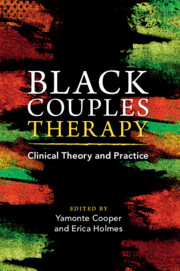Book contents
- Black Couples Therapy
- Black Couples Therapy
- Copyright page
- Contents
- Figures
- Tables
- Contributors
- Foreword
- Acknowledgments
- Introduction
- Part I Race, Racism, and Identity
- Part II Foundations for Healthy Coupling
- Part III Adapting Major Therapeutic Approaches for Work with African American Couples
- Chapter 6 Emotionally Focused Therapy with Black Couples
- Chapter 7 Use of the Gottman Method with African American Couples Impacted by Post-Traumatic Slave Syndrome
- Chapter 8 Transcending the Binary: A Narrative Therapy Approach to Work with Black Trans Men Navigating Gender Transition with Romantic Partners
- Chapter 9 Imago Therapy and the African American Couple
- Chapter 10 African American Narratives of Trauma: An EMDR Approach to Tapping into the Strengths of Black Love
- Part IV Sex and Intimacy
- Part V Special Topics
- Index
- References
Chapter 9 - Imago Therapy and the African American Couple
from Part III - Adapting Major Therapeutic Approaches for Work with African American Couples
Published online by Cambridge University Press: 27 July 2023
- Black Couples Therapy
- Black Couples Therapy
- Copyright page
- Contents
- Figures
- Tables
- Contributors
- Foreword
- Acknowledgments
- Introduction
- Part I Race, Racism, and Identity
- Part II Foundations for Healthy Coupling
- Part III Adapting Major Therapeutic Approaches for Work with African American Couples
- Chapter 6 Emotionally Focused Therapy with Black Couples
- Chapter 7 Use of the Gottman Method with African American Couples Impacted by Post-Traumatic Slave Syndrome
- Chapter 8 Transcending the Binary: A Narrative Therapy Approach to Work with Black Trans Men Navigating Gender Transition with Romantic Partners
- Chapter 9 Imago Therapy and the African American Couple
- Chapter 10 African American Narratives of Trauma: An EMDR Approach to Tapping into the Strengths of Black Love
- Part IV Sex and Intimacy
- Part V Special Topics
- Index
- References
Summary
African American couples experience lower marriage rates and divorce rates than other races. Although there are numerous research studies about strengthening the couples’ relationship, there is limited research on what therapeutic approaches best support African American marriages. Harville Hendrix’s Imago Relationship Therapy is delineated in this chapter to discuss how this counseling method can support the African American couples with relationship conflict. It gives couples the tools to learn how to resolve conflict more effectively and increase communication. Imago Relationship Therapy enables the African American couple to look at their childhood story, increase awareness of their connections, identify their triggers, and decide to move from an unconscious to a conscious one way of relating. Since research indicates that religion is vital to most African American families, Imago Therapy has been adapted to be used in church group settings which can be incorporated into the therapeutic intervention with African American couples. This therapeutic approach utilizes various structured dialogues to increase the African American couples’ knowledge of how to strengthen their relationship and developing healthy relationships.
Keywords
- Type
- Chapter
- Information
- Black Couples TherapyClinical Theory and Practice, pp. 213 - 234Publisher: Cambridge University PressPrint publication year: 2023

